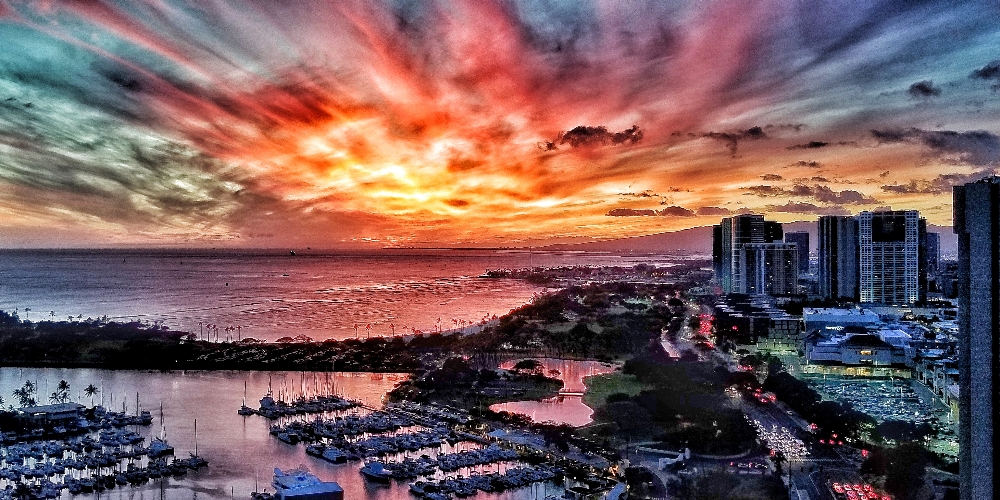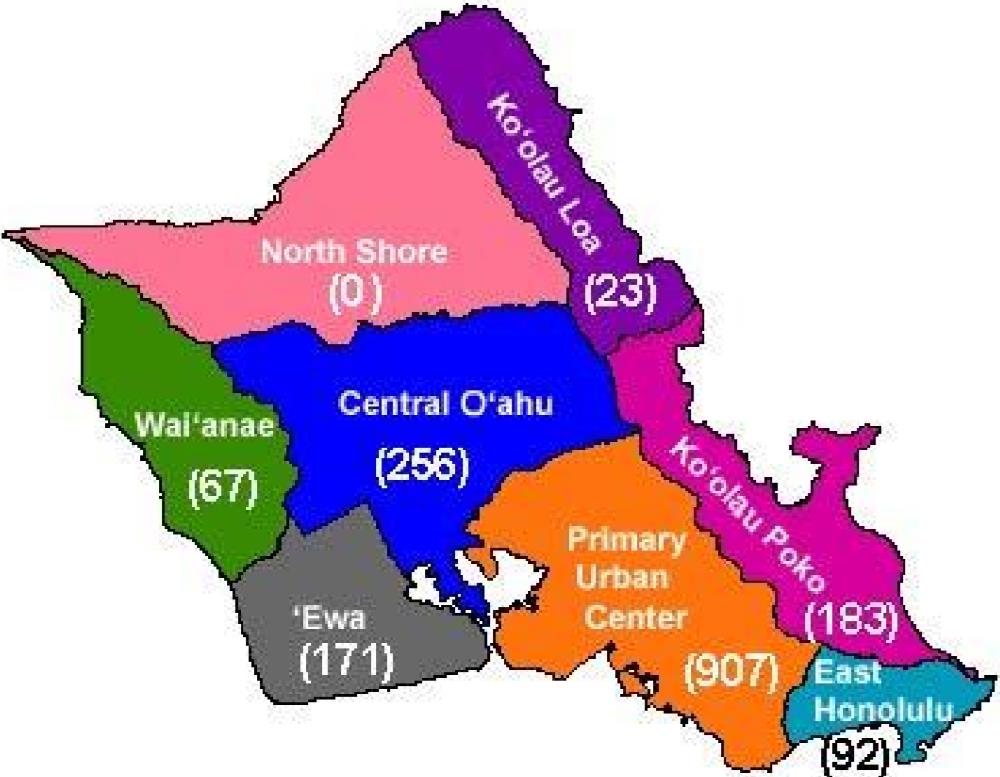— If you are renting your Oahu home or condo long-term (longer than 30 days per tenant), then you may skip this article.
However, if you are doing short-term renting, then read on to learn about Oahu’s new short-term vacation rental regulations that was signed into law on 6/25/2019.
In three simple bullet points
1) ‘Short-term Rentals (B&Bs & TVUs) outside of the ‘resort district’ are prohibited unless they have a ‘Non-Conforming Use Certificate’ (NUC).
Definitions:
- ‘Short-term Rentals’ are residential dwellings, homes or condos, that are advertised or rented with rental terms shorter than 30-consecutive days per tenant.
- ‘B&Bs’ are transient vacation rentals with the owner residing in the property.
- ‘TVUs’ are transient vacation rentals without the owner residing in the property.
- ‘Resort districts’ are limited to only some sections within Waikiki, Koolina, and the Turtle Bay Resort.
- Check this list to see all properties with a ‘NUC.’
2) Effective August 1st, 2019, merely advertising an illegal short-term vacation rental (besides operating one)is a violation and triggers stiff fines.
3) Only 1,699 additional new owner-occupied, hosted B&Bs will be permitted outside of resort zoned areas starting October 1st, 2020, subject to an application approval process and a number of restrictions.
That’s it in a nutshell. – Important additional provisions are itemized below, or you may check the DPP’s FAQ or read the entire Bill 89 here.
Before we get into the details of the new law, let’s explore what preceded this regulation and how we got to today.
Owning Hawaii real estate comes with the typical Bundle Of Rights, including the right of possession, control, exclusion, enjoyment, and disposition. That also includes the right to rent out your property, either the entire property or just a portion of it.
We are strong advocates of homeownership and property rights. We believe in the tremendous benefits of owning your home in addition to owning a sensible portfolio of investment properties for wealth creation and retirement planning. We are dedicated to excellence in assisting buyers and sellers of Hawaii real estate and providing you with important information to help you make better decisions.
Every exceptional opportunity, such as owning Hawaii properties, comes with a number of responsibilities, including the responsibility to follow the rules.
We are not attorneys. If you are an attorney, and or you have an opinion on how to better interpret the rules and responsibilities, then let us know in the comment section below. We are here to help with a humble desire to learn.
For decades up until now, existing zoning laws and vacation rental rules remained largely unchanged:
The Land Use Ordinance (LUO) defines Oahu’s zoning laws. Most people on Oahu either live in condos zoned ‘apartment’ or in single-family homes zoned ‘residential,’ e.g., R-5, R-7.5, R-10, etc.
If your home or condo is in the residential or apartment precinct then you may rent out your property long-term for minimum rental periods of 30-consecutive days as evidenced by a 30-day rental contract.
Contrary to what many think, you may not rent for a shorter period e.g., one week only and justify the short-term rental by arguing that there was no tenant for the remaining 3 weeks of the 30-day rental term. – Can you imagine some might be trying to bend the rules?
Kakaako condos come with additional rental restrictions.
See related article: The Risks Of Short-Term Vacation Renting.
When are you allowed to rent with rental terms shorter than 30-consecutive days?
Short-term vacation renting is only allowed..
a) if the underlying zoning is ‘resort’, and
b) the HOA/building house rules do not prohibit short-term vacation renting.

Outside of the ‘resort’ district, short-term vacation renting is only allowed..
c) if the individual property has a NUC (Non-confirming Use Certificate). Of all 808 current NUCs, 770 of them have been issued for TVUs (Transient Vacation Units), and 38 of them have been issued for hosted B&Bs (Bed & Breakfast). (The city stopped issuing NUCs in Sept. 1990) – Or,
d) the condo building has an ongoing active hotel operation and the property is exempt from requiring owners to hold a valid NUC, as per an unofficial list from 1990 by the Dept of Planning & Permitting.
We reviewed this list of exempt condo buildings and compiled them in the Guide To Condotels and Short-Term Vacation Rentals
—————–
Review the three key components of Bill 89 summarized in the bullet points at the beginning of this article and you notice that only item #2 and #3 are new!
Item #1 has been clearly defined in existence for decades, yet many, even seasoned real estate professionals seem to struggle with understanding and compliance. Why is that?

What has changed during the last 30 years?
$10Million visitors flock to Hawaii this year. In early 2018, an astounding 23,000! vacation rental units were advertised throughout the state of Hawaii. That represents an increase of 35% compared to two years before.
An estimated 8,000 illegal short-term vacation rentals exist on Oahu. 25% of all of Oahu’s North Shore homes have allegedly been involved in illegal short-term vacation renting.
Either property owners don’t know the rules or they simply don’t want to follow them.
How did we get to this point?
Reasons for the rapid proliferation of illegal short-term rentals:
Economic benefit. Hawaii’s tourism is booming. Seemingly never-ending demand can translate into substantially better rental returns from short-term renting compared to long-term renting. Legal short-term vacation rentals (condotels and B&Bs) are readily available to purchase, but they are limited in numbers and concentrated in resort neighborhoods.
The ‘Airbnb’ effect. We now live in the new ‘sharing economy.’ Today’s most powerful hosting platforms have successfully managed to get the host and guest to fall in love and dance the tango. Here are the winning ingredients:
- a) Booking platforms have lowered the threshold for property owners and even tenants unbeknownst to their landlords, to monetize their home, condo, cottage, bedroom, or even a living room sofa to crash on. Ease of operation, effective worldwide marketing, simple booking logistics, and hassle-free rent collection all promise to generate lucrative returns for the host. “It’s easy, you could do it too!” Effortless. Quick and easy money on the side with minimal cost and without having to work.
- b) The trust barrier has been lowered for guest. Host profiles are double verified and glowing reviews remove any remaining doubts for adventurous travelers to book. More and more consumers are becoming comfortable using convenient cell phone apps to book their next vacation or business stay, as simple as catching an Uber or Lyft.
Lack of enforcement of the existing zoning/rental rules. The DPP enforcement division only investigated infractions when a neighbor complained. And even then, it seemed to only do reluctantly. For two reasons:
- a) The burden of proof had been on the enforcement division. With the existing law, it had been almost impossible to prove violations. Rental ads only show intent and had been insufficient as proof.
- b) Consider the potential conflict of interest between DPP’s enforcement branch and the state’s tax office. The city’s DPP enforcement branch is supposed to ‘enforce the law’ while the state tax department prefers that the DPP enforcement backs off. The state needs the revenue and aggressively‘ pursues tax collection irrespective of the short-term rental income being legal or not.
Entitlement – Lack of enforcement of the existing rules created an entitlement attitude. “This is my property. I have been doing this for years and always paid my taxes. How dare the government changes the rules and tells me what I can not do.” Even seasoned real estate professionals appeared confused, seemingly doubting the validity of the long-standing existing rules while giving questionable advice to their clients.

That’s how we got to today’s dilemma with an unprecedented number of illegal vacation rentals.
A classic tale of the ‘tragedy of the commons’ where exploiters guided by self-interest compromise the integrity of communities and the quality of life in residential neighborhoods.
“The tragedy of the commons is a situation in a shared-resource system where individual users acting independently according to their own self-interest behave contrary to the common good of all users by depleting or spoiling that resource through their collective action.” ~ Wikipedia
Time to update antiquated laws?
Today’s world is different than 30 years ago. Airbnb, Expedia, VRBO, Home Away, and others are here to stay. With new regulations that improve ease of enforcement and carefully expanding short-term vacation renting, the state can have its cake and eat it too: Improving compliance and increasing tax collection.
Heated discussions ensued with polarizing arguments.
- Supporters of short-term vacation rentals argued that the state and counties should embrace diversifying the visitor base and legalize alternative accommodations. It could increase economic prosperity and tax collection. Restricting short-term vacation rentals could risk millions in lost revenue and the loss of thousands of jobs.
- Concerned residents said that illegal vacation rentals have ruined the character of their neighborhoods, diminished urgently needed housing supply and made housing less affordable for the local population. The traditional hotel-resort industry has suffered tremendous job losses as a result.
In March 2018, Hawaii Appleseed, the center for law & economic justice issued the telling report Impact On Housing & Hawaii’s Economy.
Most will agree, new short-term vacation rental regulations has been overdue.
More details about the new 2019 rules
Here are some additional provisions:
- 1) Up to 1,699 Bed & Breakfast (owner-occupied hosted transient vacation rentals) will be allowed outside of resort zoned areas starting October 2020 subject to an application/approval process and subsequent annual renewal.
- 2) The application requires a $1,000 initial application fee. Renewals are due every year by August 30th with a $2,000 annual renewal fee plus evidence of having paid all GET & TAT.
- 3) An approved B&B application is not transferable and does not run with the land.
- 4) A B&B application must include proof of sufficient insurance coverage, must have HOA approvals, if applicable, and must be compliant with any CC&Rs, bylaws, and house rules. Quiet hours must be maintained from 10 pm to 8 am. A phone number to complain must be answered 24/7 and provided to all neighbors within 250 feet of the B&B.
- 5) B&Bs cannot be closer than 1,000 ft from each other (except existing B&Bs with NUC or in the resort district) and are limited in numbers by geographical area as follows:

- 6) Bed & Breakfast homes shall be occupied by a family and shall not be used as a group living facility. No more than two guest rooms shall be rented to a maximum of four total guests at any one time. Each guest room must have one off-street parking stall available.
- 7) Exterior signs to advertise the B&B are prohibited.
- 8) B&B applicants must be a natural person and must be an owner occupant with a home exemption. An applicant must have at least 50% ownership interest in the property and can not own any interest in another B&B or TVU.
- 9) Effective August 1, 2019, all short-term vacation rental advertisements and operations need to be in compliance with the new Bill 89 regulation. The existence of an advertisement is sufficient evidence that a short-term vacation rental is being operated at the listed address. The burden of proof is now on the owner.
- 10) Advertisements of Transient Vacation Rentals must include the current registration number or the NUC number, and the full address.
- 11) Fines of up to $1,000 could be levied if the initial violation is not corrected by a specific date. Fines of up to $5,000 could be levied for each day the violation persists. Fines for recurring violations could be as high as $10,000 per day, plus the total revenue that the owner received for the cited illegal rental activity.
- 12) Besides in resort zoned areas, B&Bs and TVUs are also permitted in the A-1 low-density apartment zoning district and A-2 medium-density apartment zoning district provided:
- 13) They are within 3,500 feet of a resort zoning district of greater than 50 contiguous acres; and
- 14) The resort district and the A-1 or A-2 district, as applicable, were rezoned pursuant to the same zone change application as part of a master-planned resort community.
Note: Waikiki is not a master-planned resort community and does not have A-1 or A-2 districts. However, this provision might apply to the master-planned resort community of Koolina, provided the CC&Rs, declaration, bylaws or building house rules don’t restrict otherwise. In doubt always verify with the DPP at #768-8000 in addition to checking your condominium documents.
- 15) Effective October 1st, 2020, hosting platforms are required to provide monthly reports to the DPP, for all B&Bs and TVUs listed on the platform, including:
- The names of the persons responsible for each listing;
- The address of each listing;
- The transient accommodations tax identification number of the owner or operator of the bed and breakfast home or transient vacation unit;
- The length of stay for each listing; and
- The price paid for each stay.
Note: Hosting platforms are likely to protest these reporting requirements. We shall see how it turns out. Airbnb has been sued unsuccessfully in the past to turn over this type of information.
—————-
Note: An alternativeBill 85 was vetoed by Mayor Kirk Caldwell. And on the Hawaii state level SB 1292, aka the ‘Airbnb bill’ was vetoed by Governor David Ige. Both did not become law.
Besides Oahu, the neighbor islands are implementing their own tightened new short-term rental regulations.
Conclusion
The new law hardly restricts anything that wasn’t already prohibited. The biggest change is the ease of enforcement. Thousands of short-term rental homes and condos won’t get away as easily and could face fines. Several hundred condos in Waikiki’s apartment precinct might be short-term rentals without the owner realizing that it is against the law.
Out of a total of 876 Waikiki Banyan condos, only about 200 units have a NUC. Out of a total of 435 Waikiki Sunset condos only about 250 units have a NUC. All others are not allowed as short-term rentals.
Contrary to popular misinformation, no short-term rentals are allowed at the Waikiki Skytower and Waikiki Lanais. Yet a whopping one-third of Waikiki Lanais condos have been short-term rentals for years. Blatant ignorance could get you in trouble. Be in the know.
Whatever you do, we recommend following the law and also paying the appropriate tax obligations on rental income.
See related article: GET & TAT in Hawaii – The Easiest Way To File & Pay
We believe Hawaii will manage the potential economic ripple from the new law just fine. Perhaps some property owners will start renting their properties for 30-day minimum rental terms instead of short-term renting.
No doubt, legal short-term rentals (condotels), and condos with NUCs will benefit. Buildings like the Ilikai, Ilikai Marina and other legal short-term rentals could become more desirable for investors.
We specialize in this market segment on Oahu, together with other Honolulu condos. Let us know if there is anything we can do for you. We are here to help. ~ Aloha
—————-
Let us know your thoughts. We love to hear from you. Reciprocate Aloha: ‘Share’, ‘Like’ and ‘Comment’ below. ~ Mahalo & Aloha
The post Bill 89, Ordinance 19-18 – Hawaii’s New Short-Term Vacation Regulations appeared first on Hawaii Living Blog.